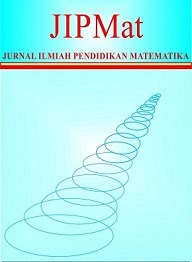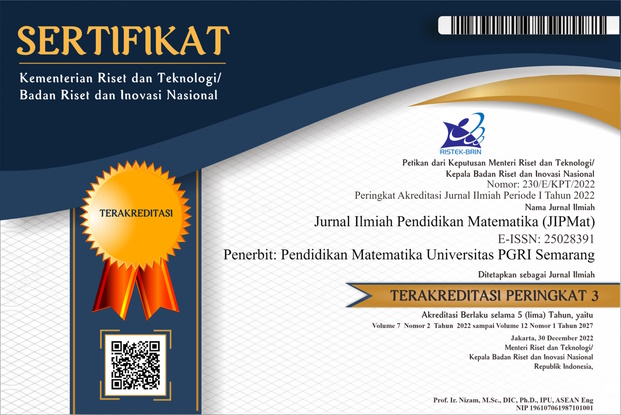EFEKTIVITAS REALISTIC MATHEMATICS EDUCATION BERBASIS HYPOTHETICAL LEARNING TRAJECTORIES TERHADAP KEMAMPUAN BERPIKIR REFLEKTIF SISWA
DOI:
https://doi.org/10.26877/dwdtj642Keywords:
berpikir reflektif, hypothetical learning trajectories, kaidah pencacahan, realistic mathematics educationAbstract
Berpikir reflektif memiliki peran penting bagi siswa pada pembelajaran matematika yang melibatkan pemecahan masalah. Namun, siswa seringkali memiliki kemampuan berpikir reflektif yang cenderung rendah. Penelitian ini bertujuan untuk menguji perbedaan kemampuan berpikir reflektif siswa yang mendapat pembelajaran Realistic Mathematics Education (RME) berbasis Hypothetical Learning Trajectories (HLT) dan siswa yang menerima pembelajaran konvensional. Penelitian ini bersifat kuantitatif quasi-eksperimental menggunakan desain non-equivalent pretest-posttest. Sebanyak 72 siswa kelas XII dari SMA Negeri 1 Boyolali menjadi subjek penelitian. Mereka dibagi menjadi kelompok eksperimen dan kontrol. Kemampuan berpikir reflektif siswa dianalisis menggunakan tes berpikir reflektif berupa soal matematika non-rutin yang telah divalidasi sebagai bagian dari alat pengumpulan data. Uji statistika inferensial dan deskriptif diterapkan dalam menganalisis data. Temuan penelitian menunjukkan bahwa siswa yang mengikuti pembelajaran RME berbasis HLT dan siswa yang mengikuti pembelajaran konvensional memiliki kemampuan berpikir reflektif yang berbeda secara signifikan. Hasil lain menunjukkan bahwa siswa yang menerima pembelajaran RME berbasis HLT mengungguli siswa yang memperoleh pembelajaran konvensional dalam hal berpikir reflektif.
References
Aiken, L. R. (1980). Content validity and reliability of single items or questionnaires. Educational and Psychological Measurement, 40(4), 955–959. https://doi.org/10.1177/001316448004000419
Akpur, U. (2020). Critical, reflective, creative thinking and their reflections on academic achievement. Thinking Skills and Creativity, 37(1), 1–8. https://doi.org/10.1016/j.tsc.2020.100683
Amalia, L., Makmuri, M., & Hakim, L. El. (2024). Learning Design: To Improve Mathematical Problem-Solving Skills Using a Contextual Approach. JIIP - Jurnal Ilmiah Ilmu Pendidikan, 7(3), 2353–2366. https://doi.org/10.54371/jiip.v7i3.3455
Ariyanto, L., Rahmawati, N. D., & Haris, A. (2020). Pengembangan Mobile Learning Game Berbasis Pendekatan Kontekstual Terhadap Pemahaman Konsep Matematis Siswa. JIPMat: Jurnal Ilmiah Pendidikan Matematika, 5(1), 36–48. https://doi.org/10.26877/jipmat.v5i1.5478
Arnellis, Suherman, & Amalita, N. (2019). Implementasi Learning Trajectory Kalkulus Berbasis Realistic Mathematics Education Untuk Meningkatkan Kemampuan Berpikir Matematis Tingkat Tinggi Siswa Sma Kota Padang. MENARA Ilmu, 13(6), 11–18.
As’ari, A. R., Candra, T. D., Yuwono, I., & Anwar, L. (2018). Matematika Studi dan Pengajaran. Dinas Pendidikan dan Kebudayaan.
Budiyono. (2016). Statistika untuk Penelitian. UNS Press.
Cohen, L., Manion, L., & Morrison, K. (2007). Research Methods in Education. Routledge.
Creswell, J. W., & Creswell, J. D. (2017). Research Design: Qualitative, Quantitative, and Mixed Methods Approaches (5th ed.). SAGE Publications.
Das, K. (2020). Realistic Mathematics & Vygotsky’s Theories in Mathematics Education. Shanlax: International Journal of Education, 9(1), 104–108. https://doi.org/10.34293/education.v9i1.3346
Dinglasan, J. K. L., Caraan, D. R. C., & Ching, D. A. (2023). Effectiveness of Realistic Mathematics Education Approach on Problem-Solving Skills of Students. International Journal of Educational Management and Development Studies, 4(2), 64–87. https://doi.org/10.53378/352980
Ekawati, R., Wintarti, A., Abadi, & Kurniasari, I. (2020). Integrating the Hypothetical Learning Trajectory with Realistic Mathematics to In-Service Teachers’ Professional Development. International Conference on Research and Academic Community Services (ICRACOS 2019), 390, 169–171. https://doi.org/10.2991/icracos-19.2020.36
Elhefni, & Saragih, S. (2023). Application of Realistic Mathematics Education (RME) Strategy in Learning Mathematics in MI/SD. Cendekiawan : Jurnal Pendidikan Dan Studi Keislaman, 2(2), 253–256. https://doi.org/10.61253/cendekiawan.v2i2.169
Evin Gencel, I., & Saracaloğlu, A. S. (2018). The Effect of Layered Curriculum on Reflective Thinking and on Self-Directed Learning Readiness of Prospective Teachers. International Journal of Progressive Education, 14(1), 8–20. https://doi.org/10.29329/ijpe.2018.129.2
Fauzan, A., & Diana, F. (2020). Learning trajectory for teaching number patterns using RME approach in junior high schools. Journal of Physics: Conference Series, 1470(1), 1–8. https://doi.org/10.1088/1742-6596/1470/1/012019
Febriani, W. D., & Sidik, G. S. (2020). The Effect of Realistic Mathematics Education (RME) on the Understand Mathematical Concepts Skills of Elementary Students Using Hypothetical Learning Trajectory (HLT). PrimaryEdu - Journal of Primary Education, 4(1), 89–99. https://doi.org/10.22460/pej.v4i1.1509
Fuady, A. (2017). Berfikir Reflektif Dalam Pembelajaran Matematika. JIPMat: Jurnal Ilmiah Pendidikan Matematika, 1(2), 104–112. https://doi.org/10.26877/jipmat.v1i2.1236
Hasrianto, Ma’rufi, M., & Ilyas, M. (2022). Pembelajaran Matematika Berbasis Masalah untuk Meningkatkan Kemampuan Berpikir Reflektif Siswa SMA. Proximal: Jurnal Penelitian Matematika Dan Pendidikan Matematika, 5(2), 159–167. https://doi.org/10.30605/proximal.v5i2.1709
Johar, R., Zubainur, C. M., Khairunnisak, C., & Zubaidah, T. (2021). Membangun Kelas yang Demokratis Melalui Pendidikan Matematika Realistik. Syiah Kuala University Press.
Juana, N. A., Kaswoto, J., Sugiman, S., & Hidayat, A. A. A. (2022). The Learning Trajectory of Set Concept Using Realistic Mathematics Education (RME). Jurnal Pendidikan Matematika, 17(1), 89–102. https://doi.org/10.22342/jpm.17.1.19077.89-102
Kholid, M. N., Sa’dijah, C., Hidayanto, E., & Permadi, H. (2020). How are students’ reflective thinking for problem solving? Journal for the Education of Gifted Young Scientists, 8(3), 1135–1146. https://doi.org/10.17478/JEGYS.688210
Kholid, M. N., Swastika, A., Ishartono, N., Nurcahyo, A., Lam, T. T., Maharani, S., Ikram, M., Murniasih, T. R., Majid, Wijaya, A. P., & Pratiwi, E. (2022). Hierarchy of Students’ Reflective Thinking Levels in Mathematical Problem Solving. Acta Scientiae, 24(6), 24–59. https://doi.org/10.17648/acta.scientiae.6883
Kizito, R. N. (2012). Realistic Mathematics Education (Rme) As An Instruction Design Perspective For Introducing The Relationship Between The Derivative And Integral Via Distance Education. University of Stellenbosch.
Kusumaningsih, W., Mustoha, A., & Rahman, F. (2018). Pengaruh Strategi Multiple Representasi Pada Pembelajaran Realistik Matematik Terhadap Kemampuan Berpikir Aljabar Siswa. JIPMat: Jurnal Ilmiah Pendidikan Matematika, 3(1), 75–80. https://doi.org/10.26877/jipmat.v3i1.2420
Maksimović, J., & Osmanović, J. (2019). Perspective of cognitive thinking and reflective teaching practice. International Journal of Cognitive Research in Science, Engineering and Education, 7(2), 1–10. https://doi.org/10.5937/IJCRSEE1902001M
Mardiah, N., Armiati, Permana, D., Yerizon, & Arnawa, I. M. (2021). The Validity of Hypothetical Learning Trajectory Based on Realistic Mathematic Education on Function Topics for Grade X Senior High School. Journal of Physics: Conference Series, 1742(1), 1–6. https://doi.org/10.1088/1742-6596/1742/1/012005
Martyaningrum, I. D., & Prabawanto, S. (2020). Analysis of students’ mathematical reflective thinking skills and habits of mind. Journal of Physics: Conference Series, 1521(3), 1–4. https://doi.org/10.1088/1742-6596/1521/3/032060
Ngololo, E. N., & Kanandjebo, L. N. (2021). Becoming reflective practitioners: Mathematics student teachers’ experiences. JRAMathEdu (Journal of Research and Advances in Mathematics Education), 6(2), 128–141. https://doi.org/10.23917/jramathedu.v6i2.12375
Nikitina, M. A., & Chernukha, I. M. (2022). Methods for Nonparametric Statistics in Scientific Research. Overview. Part 2. Theory and Practice of Meat Processing, 7(1), 151–162. https://doi.org/10.21323/2414-438X-2022-7-1-42-57
Nuriyah, K., M, A. H. A. R., Thohir, P. F. D. M., Rusdiah, N., & Sari, K. W. (2024). Adaptasi Strategi Pembelajaran Responsif terhadap Dinamika Siswa. Jurnal Basicedu, 8(5), 3843–3851. https://doi.org/10.31004/basicedu.v8i5.8674
Nurmalasari, R., Ratnaningsih, N., & Lestari, P. (2022). Analisis proses berpikir reflektif matematis peserta didik ditinjau dari tipe kepribadian guardian, artisan, rational, dan idealist. AKSIOMA : Jurnal Matematika Dan Pendidikan Matematika, 13(1), 20–39. https://doi.org/10.26877/aks.v13i1.11448
Putri, D. P., Holisin, I., & Efendi, J. F. (2022). Pengaruh Pendekatan RME dengan Model Pembelajaran Hybrid Learning terhadap Kemampuan Berpikir Kritis Matematis Siswa. JIPMat: Jurnal Ilmiah Pendidikan Matematika, 7(2), 83–96. https://doi.org/10.26877/jipmat.v7i2.12914
Putri, F., Rahmadila, & Elfira, F. (2023). Hypothetical learning trajectory of sequence and series topics based on realistic mathematics education (RME) approach for junior high school. AIP Conference Proceedings, 2805(1). https://doi.org/10.1063/5.0148582
Rahmah, A. A., Isrok’atun, & Irawati, R. (2024). Implementation of RME learning model supported by culture-based student worksheets in second-grade elementary schools to enhance mathematical understanding. AKSIOMA: Jurnal Matematika Dan Pendidikan Matematika, 15(2), 190–200. https://doi.org/10.26877/aks.v15i2.19745
Rianasari, V. F., & Guzon, A. F. H. (2024). Designing learning trajectory to support preservice mathematics teachers’ skills in creating and implementing realistic mathematics tasks. Journal on Mathematics Education, 15(3), 701–716. https://doi.org/10.22342/jme.v15i3.pp701-716
Sa’dijah, C., Kholid, M. N., Hidayanto, E., & Permadi, H. (2020). Reflective Thinking Characteristics: a Study in the Proficient Mathematics Prospective Teachers. Infinity Journal, 9(2), 159–172. https://doi.org/10.22460/infinity.v9i2.p159-172
Şen, H. Ş. (2013). Reflective Thinking Skills of Primary School Students Based on Problem Solving Ability. International Journal of Academic Research, 5(5), 41–48. https://doi.org/10.7813/2075-4124.2013/5-5/B.6
Setiyani, Waluya, S. B., Sukestiyarno, Y. L., & Cahyono, A. N. (2022). Mathematical Reflective Thinking Process of Prospective Elementary Teachers Review from the Disposition in Numerical Literacy Problems. In International Journal of Educational Methodology (Vol. 8, Issue 3, pp. 405–420).
Simon, M. A. (1995). Reconstructing Mathematics Pedagogy from a Constructivist Perspective. Journal for Research in Mathematics Education, 26(2), 114–145.
Soulié, P., & Cosson, P. (2021). Learning objectives: an epiphany. FEBS Open Bio, 11(12), 3189–3192. https://doi.org/10.1002/2211-5463.13328
Suana, W., Maharta, N., Nyeneng, I. D. P., & Wahyuni, S. (2017). Design and Implementation of Schoology-Based Blended Learning Media for Basic Physics I Course. Jurnal Pendidikan IPA Indonesia, 6(1), 170–178. https://doi.org/10.15294/jpii.v6i1.7205
Sutama, Hidayati, Y. M., & Novitasari, M. (2022). Metode Penelitian Pendidikan Matematika (Mathematics Education Research Methods). Muhammadiyah University Press.
Tunimah, L., Nursyahidah, F., & Albab, I. U. (2024). Pengembangan Hypothetical Learning Trajectory Materi Kerucut Berkonteks Tradisi Sesaji Rewanda Menggunakan PMRI Berbantuan Adobe Animate penyebab siswa mengalami kesulitan dalam belajar kerucut. AKSIOMA: Jurnal Matematika Dan Pendidikan Matematika, 15(1), 69–83. https://doi.org/10.26877/aks.v15i1.18630
Veralita, L., Rohaeti, E. E., & Purwasih, R. (2018). Meningkatkan Kemampuan Komunikasi Matematik dan Kemandirian Belajar Siswa SMP melalui Pendekatan Realistic Mathematics Education. AKSIOMA : Jurnal Matematika Dan Pendidikan Matematika, 9(1), 113. https://doi.org/10.26877/aks.v9i1.2455
Viera, A. J., & Garrett, J. M. (2005). Understanding Interobserver Agreement: The Kappa Statistic Anthony. Family Medicine, 37(5), 360–363. http://www1.cs.columbia.edu/~julia/courses/CS6998/Interrater_agreement.Kappa_statistic.pdf
Yeti̇m Karaca, S., & Özkaya, A. (2017). The Effects of Realistic Mathematics Education on Students’ Math Self Reports in Fifth Grades Mathematics Course conditions of the Creative Commons Attribution license (CC BY-NC-ND). International Journal of Curriculum and Instruction, 9(1), 81–103.
Yilmaz, G. K., & Sönmez, D. (2021). Analysis of Realistic Mathematics Education Studies Carried Out in Turkey: A Document Analysis Research. Turkish Journal of Mathematics Education, 2(1), 57–75.
Zehavi, N., & Mann, G. (2005). Instrumented Techniques and Reflective Thinking in Analytic Geometry. The Montana Mathematics Enthusiast, 2(22), 1551–3440. https://doi.org/10.54870/1551-3440.1025
Downloads
Published
Issue
Section
License
Copyright (c) 2025 Yoga Tegar Santosa, Setiya Antara, Sukimin, Nining Setyaningsih, Sri Sutarni

This work is licensed under a Creative Commons Attribution-NonCommercial-ShareAlike 4.0 International License.




